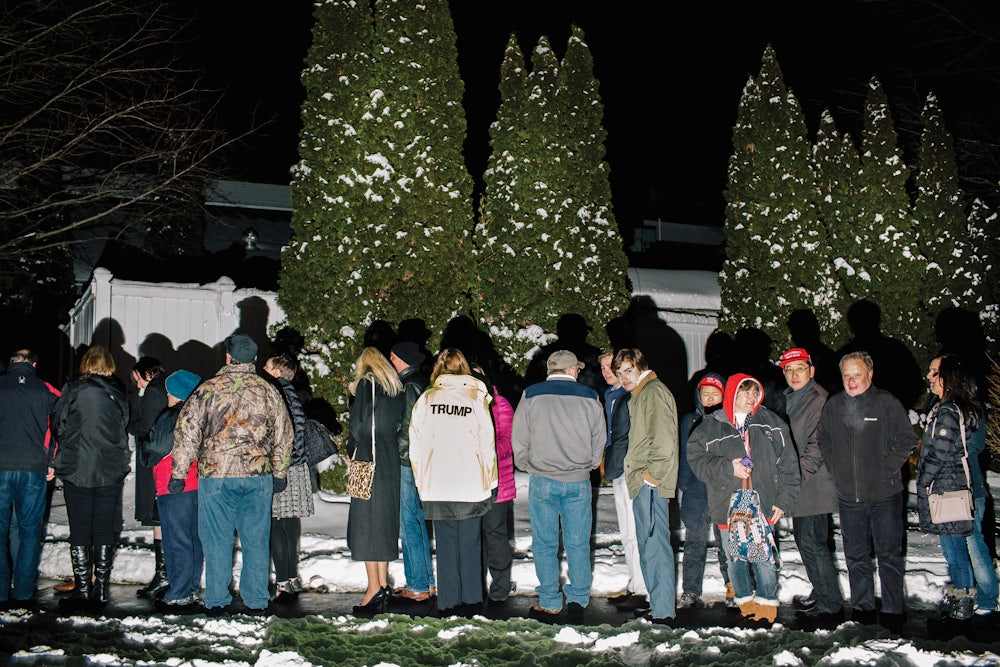If you were a reasonably active Twitter user in early 2016, then you may remember when Patricia Lockwood and The New Republic crossed paths—and it’s not because of her reportage on Trump country for the magazine. As part of the online promotion of that story, TNR handed Lockwood the reins of its Twitter account. It wasn’t long before she tweeted an obscene come-hither at Donald Trump himself, and the internet went wild. (TNR, regrettably, deleted the tweet without consideration for the Streisand Effect.)
In retrospect, it was the kind of joyous moment that rarely happens online anymore, but it would be a shame if, in the annals of TNR, it overshadowed Lockwood’s story. A decorated poet, novelist, and essayist, she took a conventional assignment—attend a Trump rally in New Hampshire on the eve of the state’s GOP primary—and turned in an observational tour de force that is as funny as it is disturbing. It remains just as illuminating and absorbing today, eight years later, in spite of all of the words spilled on Trump in the interim.
—Ryan Kearney, executive editor, The New Republic
“THE FED OWNS COWS!” a protester bellowed at me as I moved blindly toward the doors of a Donald Trump rally. It was February 8, the eve of the New Hampshire Republican primary, and I was surrounded by whirling white. “Thank you,” I said, shaking the protester’s hand. “Good luck getting those cows away from them.” Nice, I thought as I walked away. My interviewing skills were as sharp as swords from the mall. Discerning the true nature of the Trump phenomenon, one so baffling it’s in the process of ruining some of the more rational minds of our generation, was probably going to be easy.
I had touched down in Manchester a few hours before, just as darkness began to fall together with snow. I entered the Verizon Wireless Arena, a 10,000-seat venue, to see a jumbotron projecting a photograph of Melania Trump in a bikini embracing a blow-up doll of Shamu. A hallucination? It was no longer possible to tell. The great crush around me seemed to be made up of two kinds of people: Trump supporters, and people there to goggle at Trump supporters. I flowed between both, listening. The second kind loved concession snacks. The first loved snacks and also hated Muslims.
Remembering my mission, I made my way to the media “pen”—a special zoo at the back of the arena for reporters, which was populated by a hectic collection of humans in black peacoats who seemed capable of watching C-SPAN without screaming—and took my place at a table among them, though I did not feel I belonged. I was there as a person who thought a great deal about farce, and where it turned into something else.
The pattern-finding sense goes wild in such a place. The corner of the eye takes over the whole. Language as I knew it had either ceased to exist, or else reverted to an automatic form. A phrase lit in a mouth was spoken, went looking for another. A different kind of thinking was happening—the kind you find around racetracks, casinos, the floor of the stock market. I had not thought politics was a physical pleasure. Feeling the air crackle around me, I knew it must be.
Trump was 15 minutes late. I sat, fidgeting, then stood. I tried leaning with both fists on the table in the manner of a news gorilla, but the posture didn’t suit me. An investigative trip to the bathroom revealed an unlooked-for horror. “The largest turd I have ever seen in my life is in the women’s restroom at the Donald Trump rally,” I tweeted, then received multiple responses that suggested perhaps the turd was Trump himself. That’s terrible. Terrible.
The word MONARCHS was printed across the top tier of seats, in honor of the local hockey franchise. Under its shadow, I watched who the crowd parted for, who they blocked, the nearly ineffable thickenings and thinnings among people. It was not anger I felt, exactly. It was volatility, a sort of revved and ready tribalism that waited and even wished to be disproved. All it would take to disprove it was the sudden and unexpected sight of an other.
From stage right, a man in a familiar gray sweater came toward me. My Uber driver, Babiker, slender, fortyish, with a slight Sudanese accent, walked past the media pen with a friend and gave me an incognito nod. He had picked me up earlier at the airport, and when I asked him to take me to the Trump rally, he glanced at me with careful assessment in the rearview, the flash of alarm in his eyes quickly painted over by diplomacy.
“Not for that reason,” I hastened to explain, and he released a long breath. I inquired which candidate looked best to him, and he touched a professorial finger to his temple and told me he liked Bernie Sanders. “I like what he has to say.” Still, he wanted all the facts at his disposal. “I might come check out the rally, when the lines are gone,” he said, dropping me off at the curb. “I’ve never heard him speak.”
I never suspected I’d be so happy to see any stranger and gave him and his friend a small wave. As soon as they were seated, they were immediately swarmed by interviewers tilting their microphones down, because, as Babiker and his friend would tell me later, they were the only black people there.
Thirty minutes. Occasionally people appeared at the podium to whip up the crowd, or to winkingly plead with us not to harm any protesters who might manifest. Still no sign of the man himself. The absence of his bombast created an actual vacuum at the center of the arena that Elton John rushed in to fill; his great 1970s hits played so repeatedly over the loudspeakers that “Tiny Dancer” began to trend on Twitter.
Finally, 45 minutes late, Trump appeared onstage, wearing a cobalt tie and with fresh comb marks in his hair. “It’s a movement, folks,” he told the 5,000 people who had turned out to hear him. Well, yes, if that turd in the bathroom has anything to say about it, it is.
A Trump impersonator came forth from the pit to meet his maker. “I hope you’re making a lot of money,” Trump told him, hugely pleased. “Melania, would you have married this guy?” he asked his wife, and I imagined Melania rearranging the diamond planes of her face to acknowledge receipt of the joke. She wore an outfit best described as Sensual Band-Aid and took small, ruthlessly edited steps. The last thing she ever tweeted was “Happy Fourth of July!” with a picture of an American flag, two weeks after her husband announced his candidacy for president of the United States.
Some of the darkest boos arose when he pointed to us in our journalistic zoo. “The Fed owns cows!” I almost volleyed back. Cheers arose when he mentioned Christmas, building a wall between the United States and Mexico, and the virtues of waterboarding. Trump appeared to wish something worse than waterboarding would be invented. He appeared to wish terror suspects would be placed under Niagara Falls and ordered to catch it with their mouths. The terms and exhortations blended together, until you thought, “Well, hell. Why not build a wall out of water on Christmas?” Solve all the problems at once. Did someone, somewhere heckle the idea of us building a wall out of water on Christmas, in order to keep America safe? Trump wagged his head. “The wall’s gonna just get bigger when he has that attitude.”
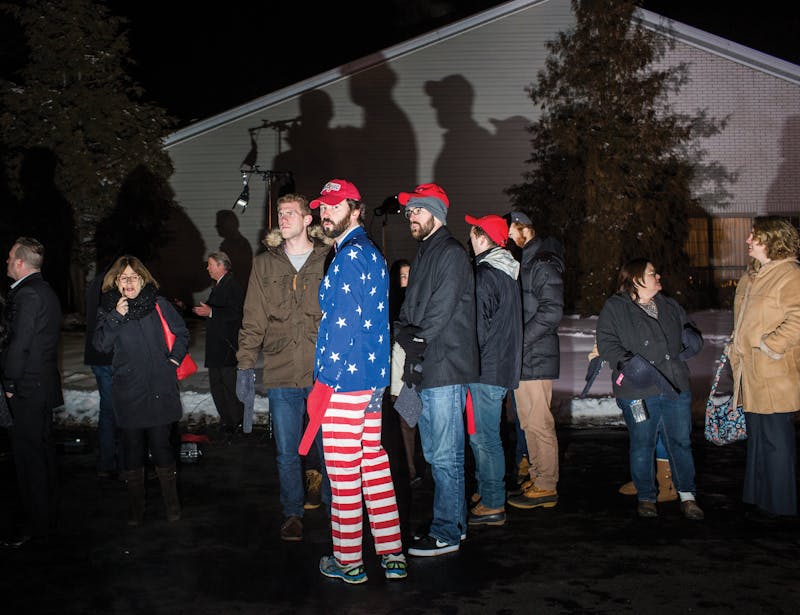
The protesters were halfhearted, perhaps because of the snowstorm. The lettering on their signs was illegible; their shouts never reached my ears. A young man was hustled out by security, but as far as I could tell it was just because he was wearing an exceedingly strange hat. Farce has not been able to answer farce in the case of Trump. Nothing protesters do could be outrageous enough to meet the original spectacle. The ones who linger in the mind and narrative have been silent: a woman reading Claudia Rankine’s Citizen behind the orange head; a woman standing in white hijab, “Salam, I come in peace,” written on her paradisal turquoise T-shirt, until she was “escorted out” amid mounting cries.
It’s us, was the undercurrent. It’s just us in here. A handshake moved through the air as the speech walloped on, and then something more than a handshake. The more he spoke, the more Trump sounded like a rich man at dinner with a young woman whose passport is her face and her freshness, explaining to her the terms of the arrangement: that he would wear her on his arm, turning her toward the lights, that she would defer to him in public, that he would give her just enough of what he has to sustain her. I wrote in my notebook, “Trump is offering to be our sugar daddy? He wants to make America his trophy wife?” What he was really promising was freedom to move in the world the way he does, under his protection, according to his laws. Nobody owns me, he keeps telling us, not the lobbyists, not the Republican high-ups, not the Washington insiders. I’m not in anybody’s pocket; hop in mine. His wives, you might have noticed, grow lovelier and lovelier. It is a practiced seduction; it has worked before. We ignore it at our peril.
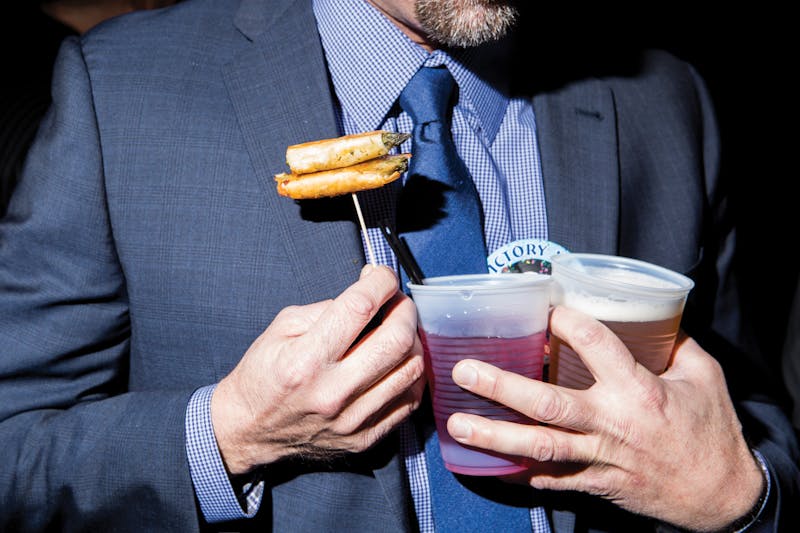
The reporters around me entered a hive rhythm, interacting with the scene entirely through their laptop screens. I wondered what they were writing, what it was possible to write. Polemic has not worked, and neither has the I-know-that-you-know-that-I-know-that-we-know tone we’ve come to adopt in straight news stories. Trump presents a surface with no handle, a wall without a door. He is the opposite of nuclear physics but has the same effect: When you set out to think about his implications, your mind runs up against the problem of scope. “We either have a country or we don’t,” he told the crowd, as another news team dashed over and bent a microphone down to Babiker.
A flurry of movement in the pit: A woman in the crowd had called Ted Cruz a pussy. In retrospect, it’s only surprising this hadn’t happened sooner. It’s surprising people don’t congregate by the millions in sports stadiums and eat nachos as they call Cruz a pussy, while a life-size vagina mascot runs around the field with a megaphone. Trump pounced. He made an oh-my-goodness face. “She said, ‘He’s a pussy.’ That’s terrible. Terrible. What kind of people do I have here?”
My heart went into free fall. The laugh that went up even in the media pen was the reason he was there, the reason he was going to win New Hampshire without breaking a sweat—no one else in the race would have said that, and there is some apparent hunger among us to be represented by a man who has the seeming freedom to say anything, who moves with impunity in a world he as good as owns. “I love you all, I love you all,” said the man who could say anything, before stepping off the stage and vanishing into the white night. “You’re special,” he told us, to a wall of identical roars, where any sound of protest could no longer be distinguished.
“Arrhahaha, that’s very funny,” a journalist with broom-yellow hair and white lips told Babiker’s friend, who was called Omar. “Will you say that again on camera?”
“I supported Trump before,” Omar repeated, in a deadpan. “But now? I think he’s a joke.”
When it was over, Omar fanned his face and made a whooshing sound. “Was it OK? My heart was beating so fast.”
“Let’s get a drink,” I proposed when Trump’s speech was over, and the three of us made our way out together through the labyrinth of the arena. We scurried into the night, Babiker bracing me against his arm so I didn’t slip on the slush, while Omar told me that he also emigrated from Sudan, five years ago, but hoped to move to Houston soon, where it’s warmer.
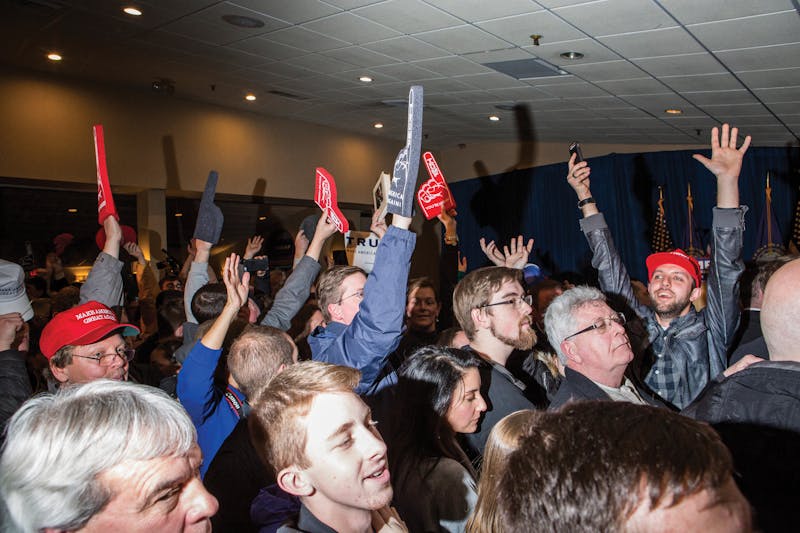
“You got interviewed by three different news crews!” I exclaimed, settling myself in the backseat of Babiker’s car.
“Yeah, four,” Babiker said.
“They saw us and said, better talk to them,” Omar said serenely.
“They were asking if you were Trump supporters.”
“And I said no,” said Babiker.
“And I said yes,” Omar countered gleefully. “And then he told me that Trump said he will never allow any Muslims in the United States.” He unfurled his voice into tremendous mock surprise like a flower, like a present. “And I said, ‘Oh, he said that?’”
“OK, listen to me,” he went on, with greater gravity. “I’m Muslim, OK? So when I see the news, ISIS, what they do, what they’re doing right now, it’s scary. I don’t want to be a part of that. But they are not Islam.”
Traffic from the rally choked the streets. Omar occasionally leaned over to speak intimately, authoritatively with Babiker in Arabic.
“We speak another language,” he said. I asked him to teach me something, and he said, “I can teach you good or bad.”
I asked him to teach me some Arabic cusses and he fell sideways laughing. No, no. A poetic, high-minded language, he reprimanded me. Trump would have to call Cruz something else, because there isn’t even a word for “pussy” in it. But later he relented and told me it is kus.
At the bar, we were seated at a round table in the corner, where we watched the snow intersect through two dark windows. Babiker ordered a Bud Light and Omar ordered a Coke, because he was practicing.
“Do you think the American people like Trump?” Babiker asked me.
“It’s hard to know, always, with Americans . . . whether we think something’s funny,” I hesitated. “Are we doing this because we think it’s hilarious? Are we just seeing how far we can push it?”
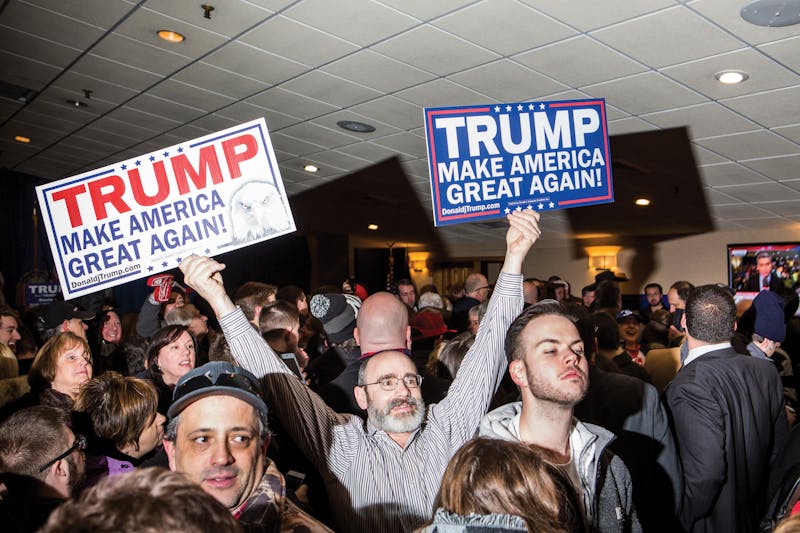
“After I dropped you off,” Babiker said, “I got three kids who said they really like him, and two who said they were going for fun.”
“Right. They wanted to see.”
Earlier, in the car, I had struggled to explain how America has always been willing to dare, and double-dog dare, and triple-dog dare itself. America has always offered to drink anything for five dollars, no matter how disgusting.
“It might be a cowboy thing,” I had said. A sort of, fuck you, and while I’m at it, fuck me!, kind of thing. I watched a million cowboy movies growing up, and in the ones where the cowboy doesn’t ride off into the sunset, he usually dies. Sometimes he dies while riding off into the sunset, slumped over on a horse. There has to be a better way.
Halfway through his Coke, Omar asked if he could read my palm, a request that surprised me. He wiped his rounded features to clear them of expression, composed himself, and looked down with a movement like diving into a pool.
“There’s no men here,” he said, genuinely astonished. “I don’t see any men in your hand at all. You are . . .?”
“Oh,” I said, startled at either my own transparency or at the fact that palm-reading was true. Not sure of the word, I told him queer. He returned to my palm. “No, there’s no men here at all,” he repeated. Good news for Hillary Clinton.
“Do you think the first human was a woman or a man?” Omar asked me later.
“I think the first person was probably a little lizard creature,” I said.
“There’s a light that came through, a single cell . . . went bang bang bang bang bang bang bang,” he said, going off like popcorn. “The same power that made the big bang gave us the mind. The god, invented by our mind. The devil, invented by our mind. When you do a good thing, you think of something bigger, and that’s God. Everything in us. In our minds, brains. What is human is very strong, and serious.”
Tuesday, 22 degrees. The primary goers were still casting their votes, and hundreds of us were waiting in a ragged, obedient line outside the Executive Court Banquet Facility, where Trump was expected to make an appearance at his official watch party. People inched together for warmth. A straw-haired woman in knockoff Louboutins and a minidress stood with her knees knocking next to the muffler of one of the news vans. The doors were supposed to open 15 minutes, half an hour, an hour ago, but we were told the Secret Service was sweeping the place for bombs.
At the far edge of the parking lot, the tall, top-heavy pines were hatched sideways with snow. Color fell from everything like fruit, until the black of the landscape was so black and the white so white that everything around me seemed proofed and printed. Small-time operations moved at the margins; a father and son offered us limited-edition Trump buttons. “Two hundred fifty of these were made, no more, no less,” recited the son, staring, his front teeth bucked and his cheap suit boxy, stumbling a little over the words.
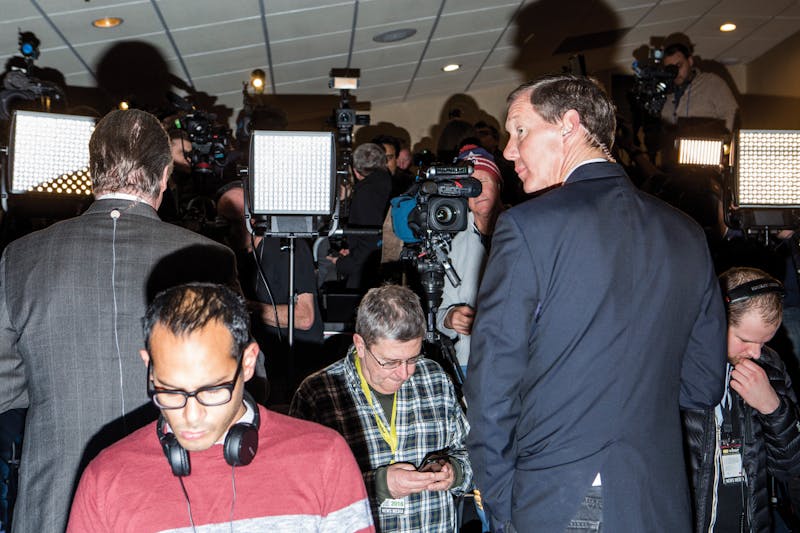
“Oh, Jesus,” I said, and Rich, a man standing next to me in line, looked after him too, wincing. “What is he, maybe 13?”
Rich’s hair curled out black-and-white from underneath his cap; he was wearing a camouflage coat that would keep him warm to 25-below, and his eyes were the frank, warm shade of Bénédictine. He had the wide, relaxed stance of someone who has long navigated physical systems with his body, with perhaps the hitch of old injury here or there. When a hawker came by with bumper stickers—DONALD TRUMP FOR VETS—Rich reached to take a few.
“I don’t have to prove it to you, do I?” he asked.
The hawker whirled around and shouted, with the sort of intensity that prefaces a murder, “Whyyyyy would you? I’m not Obama!”
Laughing, Rich passed me one, too, with a gesture so familiar I thought Navy—a nuke, maybe—and it turned out to be true: He was on submarines, just as my father was. The things submariners say and do can surprise in either direction: They are not above a gestural fuck you; old-school masculinity coexists with a tendency to cry and drink Rumple Minze. Rich doesn’t drink any more, though, he told me—he liked it too much. He’s also been a vegetarian for 15 years, because when his daughter was little she was afraid of the toilet, afraid of something coming up out of it, “and so I said to her, well, I’ll give up something I like.”
I couldn’t see how this connected, but, “Please, may I write that down?” I asked. And then the jig was up: I was there to write about it.
“Why Trump?” I asked him, too cold to be anything less than direct.
Rich weighed the question, then told me he was tired of the way things were; he wanted something different. “He’s the only one who’s saying what people are thinking.” Rich was responsive to physical and verbal charisma, which he said Obama has, which George W. Bush and Bill Clinton had—and which Trump has, in abundance; he is neither beautiful nor a beautiful speaker, but he always looks and sounds exactly like himself. His reality show was successful because it confirmed a condition we always suspected: We see and hear him perpetually on television.
A great-grandmother barely five feet tall, with dyed dark ringlets and a half moon of melted mascara under each eye, sidled up alongside us as if she belonged there. She was wearing a denim Blossom hat she occasionally adjusted with great care. She was born Diana Ross (“You’ll never believe it! Wrong color, and I can’t sing!”) but had given up this glamorous last name after marrying. If you woke from a hundred-year sleep and chatted with Diana for five minutes, you would come away with an excellent gloss of current conservative preoccupations and catchphrases.
“I had a daughter said she was voting for Hillary. Hitlery, I call her Hitlery.” Then, gathering her breath forcefully, she nearly screamed: “The emails!”
Diana swooped from one conspiracy theory to the next on the patriotic wings of an eagle. “Did you hear about Marco Rubio maybe having a gay thing in his younger days? They got a picture of him in a gay lake, you know, full of gay guys.”
I suppressed an urge to grip her hand and ask, Where is this gay lake, Diana Ross?
“You can only see the back of his head,” she continued. “So they don’t know if it was him. I don’t know if it’s true!”
Despite the interminable, freezing wait, no one considered leaving, and there wasn’t a breath of blame for the presumptive victor at that victory party. It was the principle of the thing, we agreed. We were doing it to say we did it.
The hawkers continued like stars in their courses; their uniform affect was that of hot dog vendors with meth psychosis. One held up a T-shirt where Trump had been pictorially reimagined as Dirty Harry, hollering, “Go ahead, ISIS, make my daaaaaaay!” The hawker pointed to his colostomy bag and told us he could be “living it up” on $800 a month, except he never applied for disability.
“Good for you!” screamed a man in line, who presumably did not have a colostomy bag.
“Have you seen the other thing on YouTube,” Diana asked, “about how Michelle Obama used to be a man? Oh,” she said, gesturing to her pecs and trapezoids, “It shows the shoulders and everything. Then again, African women are big. You know, I don’t know if it’s true!”
Two and a half hours, and ahead of us we felt a flicker of movement. The line became liquid, solid, liquid. “I say what I think! You know, it gets easier as you get older,” Diana reassured me, before trotting through the metal detector so enthusiastically she set it beeping. Rich wondered out loud if he was going to get frisked by security, like he always did at the airport.
“I get profiled,” he shrugged. “I’m half Middle Eastern. When I grow the beard, I get it.” Good thing, he added dryly, that he left his knife in the car.
As soon as they let us in, everyone flooded toward the bar, not so much because they were in the mood to party, but because it seemed like the most efficient way to get warm. I spotted Mark, a Man in Aerospace who was a few spots ahead of me in the line outside, and he ordered me a Grey Goose. He’s a vodka snob, he told me conspiratorially, because he spent time in the Ukraine, and people there know how to drink. He had met his wife in Kiev, at a Christmas party when she was a teenager, and brought her back home with him.
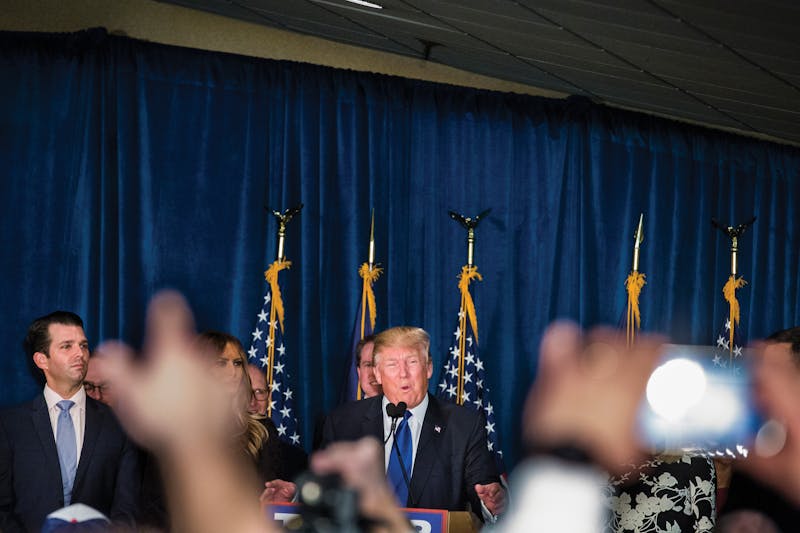
We had just commenced to thaw when the primary results began to blare red-white-and-blue from the flatscreen TVs ranged around the room: Trump had won in a landslide. No surprise. We all expected it, but still the people tilted their heads up to the ceiling and released bright streamers and balloons of sound.
Mark had a trim, minnowish narrowness that suggested he moved swiftly, easily, and silvery through the channels of business. We scanned the crowd, speculating on who might be a plant, reporter, or infiltrator. “He’s not a Trump supporter. That one is here ironically,” I said, pointing to a young bearded man dressed as Uncle Sam.
“Is he?” Mark asked, interested, clearly unable to read my generation’s comic signifiers.
“Oh, yes,” I said, blushing. “The Bubba Gump Shrimp Company hat is how you can tell.”
No wonder they believe millennials have fatally diverged from their path. How would I explain to someone like Mark the legions of teenagers who spend a significant portion of their free time tweeting “fuck me daddy” at Barack Obama and the pope?
The room was split between people already sitting atop their gold dragon hoards and those treating the very promise as riches, held in the hand, waiting only for the fingers to close over it. The atmosphere was bizarrely, insistently sexual. I had seen this even outside, as the cut-rate Ivana in the minidress nibbled the ear of her wind-reddened husband and he leaned back to nuzzle her with his mustache, both made insatiably horny by Trump’s incipient victory. Inside, small dominations and submissions ran through the crowd, and one could easily imagine an after-hours version of that party where half of us were carrying whips, the other half were wearing collars, and the Bubba Gump Shrimp guy was on all fours dressed as a pony. In short, it was difficult to be there without imagining Donald Trump roaring “Wow—yes—wonderful, Melania” at exactly the same pitch and volume as he had roared at the rally “They’re chopping people’s heads off in the Middle East!”
When I found Rich again in the middle of the crowd, he hugged me. “A lot of people would describe this as a disaster,” I ventured. “We waited in the freezing cold for two hours, now another two hours in here, and he’ll probably only come out for a couple of minutes. What would he have to do to upset or disappoint you?”
“He would have to get up there and say, ‘Screw the vets.’ ” Trump, Rich believes, is the only candidate making any credible promises about veterans. “These guys get home and there’s nothing here for them. A lot of them can’t even go into law enforcement because of what they’ve been through.”
I nodded neutrally. My brother is a staff sergeant in the Marines, and since returning home he’s worked in hazmat situations, cleaning up homes of hoarders and the dead, at a hardware store, and most recently for a train company that laid him off a week before Christmas—and he’s doing well compared to others in his company who are dying of drink and suicide.
We took turns saying, “I don’t know, I don’t know the answer.” Rich now works for a power company, the name of which is so locally reviled that people yell at him when he reveals it. “I’m about to start telling them I work at Wendy’s,” he said.
“You know, I’m kind of a Ted Cruz guy,” Mark finally confessed, staring soulfully into his fifth Sam Adams Seasonal.
“Is he electable?” I demanded, my veins flooding with three sips of Grey Goose. “Is Ted Cruz electable?”
“Why wouldn’t he be electable?” Mark asked.
“Because he looks like he was grown from fetal pig tissue in a cowboy boot,” I hissed. Blood was coming out of my eyes, blood was coming out of my—wherever. I pressed my drink against my lower lip to prevent myself from releasing any more descriptions of the heinous pig-boot Ted.
I decided to propose a toast. “What do the Ukrainians say?” I asked Mark. He raised his glass and waited for our silence.
“From each according to their ability, to each according to their need!”
And so it happened that on the same night Bernie Sanders was delivering his victory speech in a jam-packed room in Concord, we raised our plastic glasses in a toast made famous by Karl Marx.
A curious fact you may have heard elsewhere: The most die-hard Trump fanatics I encountered did not hate Sanders in the slightest. Among that crowd, it appeared to be because they had college-aged daughters, and many of their daughters like Bernie; they like what he has to say. “They think he’s gonna give them free college,” the fathers said, rolling their eyes—though free college might be nice.
The theme of daughters had come up again and again. The night before, Omar told me his daughter was eight years old, “and she is so, so sweet,” he said, placing a hand against his heart, “but I do not want her to be that way. I want her to be tougher.” I thought how Hillary had rebounded in 2008 after she lost Iowa and cried on TV. At our watch party, they booed through the entirety of her white-turtlenecked concession speech, shouted “liar,” told me they couldn’t stand the sound of her voice. I wondered what it would look like for a man to vote in his daughter’s best interest, what it would mean for the country if he did.
I heard a roar go up, the roar. I snatched my phone out of my pocket and propped my elbow high on Rich’s shoulder so I could record Trump’s victory speech with a steady hand. Rich bore this patiently, in the manner of a Saint Bernard who occasionally permits the household baby to ride it. The crowd swelled toward the podium and I stood on tiptoe, peering between heads and red hats and foam fingers to see.
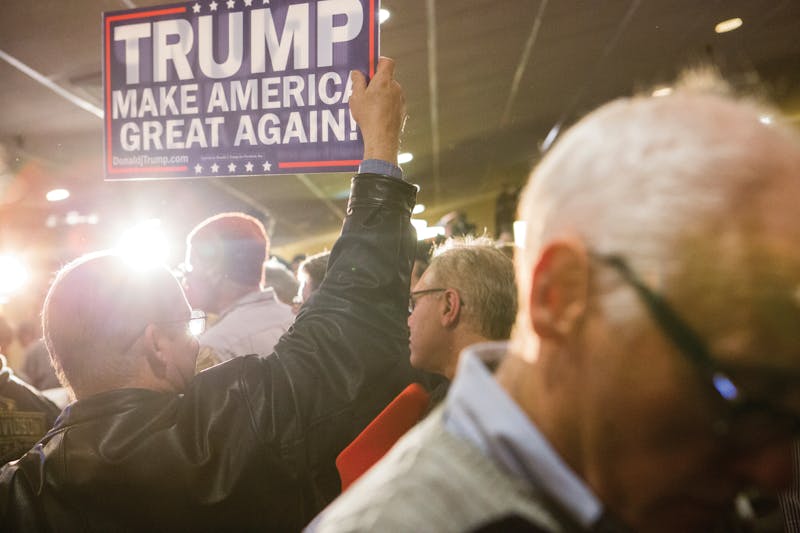
I expected to feel his presence oppressively, but instead, in that small space, I registered him as being barely there—an empty vacuum into which the winds of whiteness, maleness, money, bigotry, and big talk were constantly rushing. Rather than being drawn toward a vortex of charisma, I found myself floating away from Trump entirely, preferring to apply my mind to anything else in the room—toward the people around me, who told me unequivocally that he speaks for them.
I focused on Melania’s face, poised like an apple on the tip of a sword. It did not move; its stillness was preparatory to a performance that never came. She was wearing a black dress with a silver buckle at the center of it, perhaps chosen to recall a pilgrim’s shoe. She was born Melanija Knavs in Slovenia, and now she stood at Trump’s right hand, and hers was the head I wanted to be inside, even more than Ivanka’s. Ivanka, the favored daughter, showered with gold from above, stood at his left hand. She was so, so pregnant—two weeks from giving birth, her proud father told the crowd at the rally the night before. She had been at the polls all day shaking hands. Her face was not quite as polished as her stepmother’s; something occasionally fought in it, and from time to time she nearly mouthed a talking point along with her father, then gave a slight nod of relief when he had delivered it. But still she stood statuesque next to him, matched by Melania on the other side, so the two women resembled the twin female sphinxes in The NeverEnding Story, in the service of a power I could not quite identify.
“I’m so happy,” said a young man behind me, sweating waxily like a farmer’s cheese, the corners of his smile reaching toward his ears. “So happy right now,” just a split-second before Trump literally told the crowd, “I am going to make you so happy,” and there it was again, the kind of sentence you never hear in politics, the sort of thing you say to a woman when you are promising her everything—a promise whose falseness inheres in it, but perhaps you are so grateful to hear it at all.
I turned to look at Mark, who brought back his 18-year-old bride from Kiev. “My wife had only one pair of shoes, and they didn’t fit,” he had said to me earlier, vehement. “She had only one sweater for three years.” But look, his face told me, what I have given her now. A whole country, an entire new life, a gift that was mine to give.
The center of everyone’s attention, who started his speech the color of a sweet potato soufflé, had progressed to the unnatural, hectoring scarlet of a stick of sidewalk chalk. I found myself in the perplexing position of wanting to write a thousand words about the shape of his lips. Trump held up a theatrical thumb and hurried offstage, with the itching haste of a germophobe who has found himself in a close crowd of the contagious. Fifteen minutes and it was over. That was such a nothing, I think. But when I catch the speech again later, on TV, every smallest movement reads—as if he hadn’t been speaking to us at all, but to those cameras that still followed him, in his mind and ours.
I moved toward the doors, and Rich trailed me with his hands in his pockets, telling me if my Uber driver were busy, he could take me home. “I’m safe,” he assured me simply.
As we walked past the parked vans, we were stopped by another news crew, and Rich repeated to the bright lights that Trump is saying what most of us are thinking, that people are tired of career politicians and want something different, something new. He strode ahead of me toward the car, with that barely perceptible hint of ancient injury somewhere in his bearing, and I thought of the boy inside dressed up as Uncle Sam and felt suddenly ashamed: Votes, even ones incomprehensible to us, rise out of real lives, out of the distance between what we have and what we hope for ourselves.
Rich drove me the winding way back through the snow, occasionally slipping toward the middle of the road. He had turned a little melancholy, as men sometimes do at the end of the night, at the tail end of long conversations where you have asked them to tell you everything about themselves. A row of red hearts flashed; his daughter was texting him. He called her and they talked for a moment in a sweet private language, not baby talk, but in the same family, promising that he was on his way.
The next morning, softened snow slid off the roofs of the houses, each of which came to a neat point like a pencil. When Babiker arrived to bring me to the airport, Omar was sitting next to him in the front, smiling at my surprise. “I missed you yesterday!” he told me. “I cried for two hours!”
They wanted to know about the watch party. Was it crazy people? “Sort of,” I said, wishing to be honest. “I mean, I was there, too. At one point I started insulting the wigs of the Founding Fathers.”
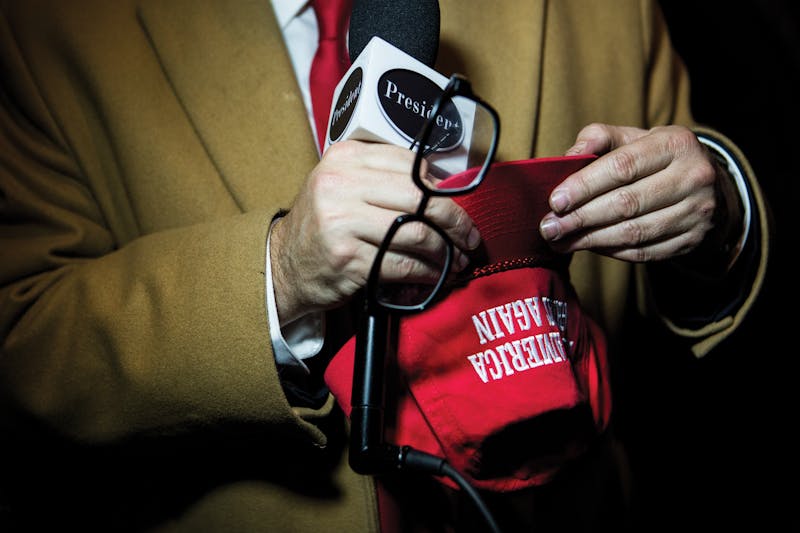
“I’m sorry I missed your text,” Babiker said. “I was watching the results. I was having drinks. I watched Trump’s speech, and I don’t think he knows how to think,” he added, pointing to his temple.
“No, he just says things,” I mused, remembering Omar telling me in that darkened bar that what separates us from the animals is the tongue, remembering Trump’s voice before that telling us we cannot allow animals into our country.
“Come back again,” Babiker said as he dropped me off, a look in his eye like lights on a hill. His face, caught up and expectant, declared him a full fevered participant in the strangest election season America has seen since anyone can remember, one in which everything might really be at stake, though of course we say that every time—as a mindless chant, a pinch of salt, a superstition to ward off the day it will be true. “We will be here. Come back for the election, come back and we will take you anywhere.”
